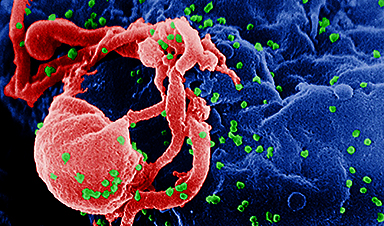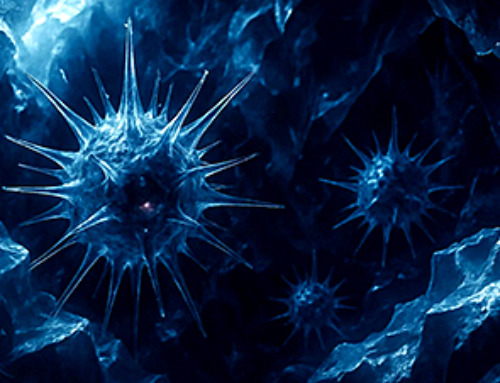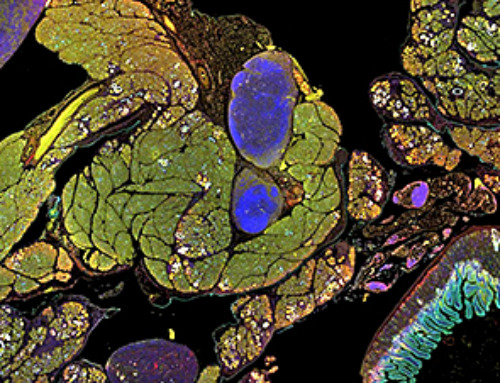HIV has been completely eliminated from cells in a laboratory, raising hopes of a future cure.
Researchers completed the revolutionary task by using a gene-editing tool known as Crispr-Cas, which won the Nobel Prize in 2020, and targets the virus’s DNA.
Using the tool essentially like scissors, they removed all traces of the virus from infected cells and allowed unwanted genes to be deleted, or new genetic material to be introduced into cells.
The researchers from Amsterdam UMC, Netherlands, said they aim to create a robust and safe Crispr-Cas regimen, to create an inclusive ‘HIV cure for all’ that can render a range of HIV strains inactive.
The scientists, led by Dr Elena Herrera-Carrillo, said they have created an efficient attack on the virus in various cells and where it may be hiding, which they say represents a pivotal advancement towards developing a cure strategy.
The study was presented at the European Congress of Clinical Microbiology and Infectious Diseases and saw the researchers focus on parts of the virus that stay the same across all known HIV strains.
They say this will help them provide a broad-spectrum therapy capable of combating multiple HIV variants effectively, but stressed their work provides proof of a concept, and will not become a cure for HIV tomorrow.
They say the next steps involve optimising the delivery route to target the majority of the HIV reservoir cells.
The hope is to devise a strategy to make this system as safe as possible for future clinical applications, and achieve the right balance between efficacy and safety.
‘Only then can we consider clinical trials of ‘cure’ in humans to disable the HIV reservoir,’ the researchers said. ‘While these preliminary findings are very encouraging, it is premature to declare that there is a functional HIV cure on the horizon.’
Scientists at the University of Pittsburgh School of Medicine have also identified drug candidates that show promise in reversing the ability of HIV to escape detection by the immune system.
In the journal Cell Chemical Biology, the researchers reveal they have found a potential path to clear a viral reservoir that can’t be cleared with existing antiretroviral drugs, and is something that currently prevents people from being completely cured of HIV.
Senior author Dr Thomas Smithgall said: ‘We have excellent antiretroviral drugs that suppress HIV, but unfortunately, none of them clear the virus. If someone with HIV stops taking their medication, the infection will rebound.
‘HIV establishes a reservoir of infected cells that lay dormant even in the presence of antiretroviral therapy, hiding from immune system detection. We think we’ve uncovered a key to unmasking that reservoir.’
News
Studies detail high rates of long COVID among healthcare, dental workers
Researchers have estimated approximately 8% of Americas have ever experienced long COVID, or lasting symptoms, following an acute COVID-19 infection. Now two recent international studies suggest that the percentage is much higher among healthcare workers [...]
Melting Arctic Ice May Unleash Ancient Deadly Diseases, Scientists Warn
Melting Arctic ice increases human and animal interactions, raising the risk of infectious disease spread. Researchers urge early intervention and surveillance. Climate change is opening new pathways for the spread of infectious diseases such [...]
Scientists May Have Found a Secret Weapon To Stop Pancreatic Cancer Before It Starts
Researchers at Cold Spring Harbor Laboratory have found that blocking the FGFR2 and EGFR genes can stop early-stage pancreatic cancer from progressing, offering a promising path toward prevention. Pancreatic cancer is expected to become [...]
Breakthrough Drug Restores Vision: Researchers Successfully Reverse Retinal Damage
Blocking the PROX1 protein allowed KAIST researchers to regenerate damaged retinas and restore vision in mice. Vision is one of the most important human senses, yet more than 300 million people around the world are at [...]
Differentiating cancerous and healthy cells through motion analysis
Researchers from Tokyo Metropolitan University have found that the motion of unlabeled cells can be used to tell whether they are cancerous or healthy. They observed malignant fibrosarcoma [...]
This Tiny Cellular Gate Could Be the Key to Curing Cancer – And Regrowing Hair
After more than five decades of mystery, scientists have finally unveiled the detailed structure and function of a long-theorized molecular machine in our mitochondria — the mitochondrial pyruvate carrier. This microscopic gatekeeper controls how [...]
Unlocking Vision’s Secrets: Researchers Reveal 3D Structure of Key Eye Protein
Researchers have uncovered the 3D structure of RBP3, a key protein in vision, revealing how it transports retinoids and fatty acids and how its dysfunction may lead to retinal diseases. Proteins play a critical [...]
5 Key Facts About Nanoplastics and How They Affect the Human Body
Nanoplastics are typically defined as plastic particles smaller than 1000 nanometers. These particles are increasingly being detected in human tissues: they can bypass biological barriers, accumulate in organs, and may influence health in ways [...]
Measles Is Back: Doctors Warn of Dangerous Surge Across the U.S.
Parents are encouraged to contact their pediatrician if their child has been exposed to measles or is showing symptoms. Pediatric infectious disease experts are emphasizing the critical importance of measles vaccination, as the highly [...]
AI at the Speed of Light: How Silicon Photonics Are Reinventing Hardware
A cutting-edge AI acceleration platform powered by light rather than electricity could revolutionize how AI is trained and deployed. Using photonic integrated circuits made from advanced III-V semiconductors, researchers have developed a system that vastly [...]
A Grain of Brain, 523 Million Synapses, Most Complicated Neuroscience Experiment Ever Attempted
A team of over 150 scientists has achieved what once seemed impossible: a complete wiring and activity map of a tiny section of a mammalian brain. This feat, part of the MICrONS Project, rivals [...]
The Secret “Radar” Bacteria Use To Outsmart Their Enemies
A chemical radar allows bacteria to sense and eliminate predators. Investigating how microorganisms communicate deepens our understanding of the complex ecological interactions that shape our environment is an area of key focus for the [...]
Psychologists explore ethical issues associated with human-AI relationships
It's becoming increasingly commonplace for people to develop intimate, long-term relationships with artificial intelligence (AI) technologies. At their extreme, people have "married" their AI companions in non-legally binding ceremonies, and at least two people [...]
When You Lose Weight, Where Does It Actually Go?
Most health professionals lack a clear understanding of how body fat is lost, often subscribing to misconceptions like fat converting to energy or muscle. The truth is, fat is actually broken down into carbon [...]
How Everyday Plastics Quietly Turn Into DNA-Damaging Nanoparticles
The same unique structure that makes plastic so versatile also makes it susceptible to breaking down into harmful micro- and nanoscale particles. The world is saturated with trillions of microscopic and nanoscopic plastic particles, some smaller [...]
AI Outperforms Physicians in Real-World Urgent Care Decisions, Study Finds
The study, conducted at the virtual urgent care clinic Cedars-Sinai Connect in LA, compared recommendations given in about 500 visits of adult patients with relatively common symptoms – respiratory, urinary, eye, vaginal and dental. [...]






















